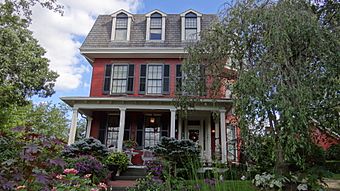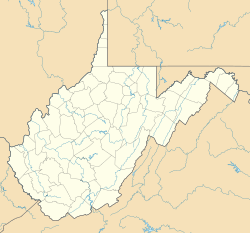Alexander Wade House facts for kids
|
Alexander Wade House
|
|
|
U.S. Historic district
Contributing property |
|

Alexander Wade House, September 2012
|
|
| Location | 256 Prairie St., Morgantown, West Virginia |
|---|---|
| Area | less than one acre |
| Built | 1860 |
| Architectural style | Mixed (more Than 2 Styles From Different Periods) |
| Part of | Chancery Hill Historic District (2001 increase) (ID01001405) |
| NRHP reference No. | 66000752 |
Quick facts for kids Significant dates |
|
| Added to NRHP | October 15, 1966 |
| Designated NHL | December 21, 1965 |
| Designated CP | November 29, 2001 |
The Alexander Wade House is a special old home in Morgantown, West Virginia. It was built in 1860. From 1872 until he passed away, it was the home of a very important teacher named Alexander Wade. He lived there until 1904. Alexander Wade created a new way to test students and help them move up grades. This system became very popular across the country. Because of its history, the house was named a U.S. National Historic Landmark in 1965.
About the Alexander Wade House
The Alexander Wade House is located in Morgantown, West Virginia. It is in an area called Chancery Hill. The house is a two-and-a-half-story building made of brick. It has a special roof called a mansard roof with dormer windows.
The front of the house has three sections. A porch runs across the front. It is supported by square columns. The windows are rectangular. They have stone sills and lintels.
History of the Historic Home
The house was built in 1860. It was first built for a judge named Edward Bunker. Back then, it looked more like a Greek Revival style home. It had a gabled roof.
In 1911, the house was changed. The mansard roof was added. The building was also divided into apartments.
Alexander Wade's Important Work
Alexander Wade bought the house in 1872. He was an educator from Maryland. He became the superintendent of schools in Monongalia County.
Wade started trying out a new system. He used grading and special tests for students. This helped students in rural schools move through grades more easily. It made their progress more organized.
In 1879, Wade shared his ideas. He presented them to the National Education Association. His system was approved. It was later used by many school systems across the United States. Alexander Wade also believed the United States should use the metric system.
 | Isaac Myers |
 | D. Hamilton Jackson |
 | A. Philip Randolph |



